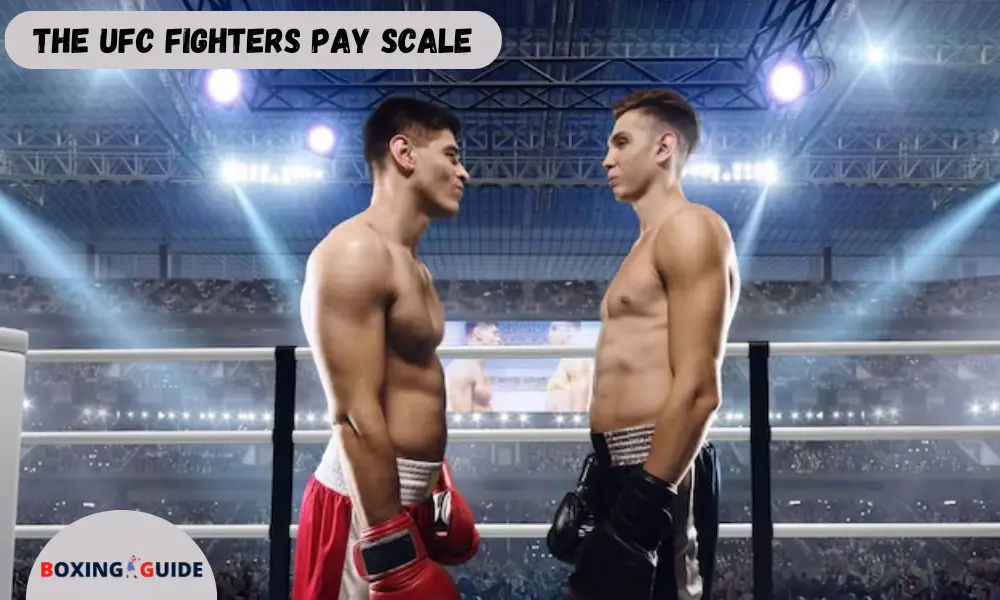The UFC Fighters Pay Scale is a topic that has been discussed and debated for years. With the sport of mixed martial arts (MMA) gaining more and more popularity, it’s important to understand how fighters are compensated for their hard work and dedication.
Mixed martial arts have become one of the fastest-growing sports in the world, and the Ultimate Fighting Championship (UFC) is the most popular organization within the sport.
UFC fighters are some of the toughest and most skilled athletes in the world, and their fights are watched by millions of people worldwide.
However, the UFC fighters pay scale has been a controversial topic for many years, with many fighters speaking out against what they perceive as unfair compensation.
In this article, we’ll take an in-depth look at the UFC fighters pay scale and explore the factors that influence their earnings.

The Basics of UFC Fighters Pay
The UFC fighter pay structure is relatively simple. Fighters receive base pay, which is determined by their contract with the UFC. This base pay is then supplemented by performance bonuses, which are awarded to fighters who win their fights or put on an exciting show, as determined by the UFC management team. In addition, fighters may receive sponsorship deals, which can significantly increase their earnings.
Factors that Affect UFC Fighters Pay
Several factors can influence a UFC fighter pay, including their performance, popularity, and marketability.
Performance
The most critical factor that influences a fighter’s pay is their performance in the octagon. UFC fighters are paid more if they win their fights or put on an exciting show. This incentivizes fighters to perform at their best and to entertain the fans, which is ultimately good for the sport.
Popularity
Popularity is another significant factor that influences a fighter’s pay. Fighters who have a large fan base and generate a lot of buzz around their fights are typically paid more than less well-known fighters. This is because more popular fighters bring in more revenue for the UFC through pay-per-view sales and ticket sales.
Marketability
Marketability is also an essential factor that influences a fighter’s pay. Fighters who are marketable and can attract sponsorship deals can significantly increase their earnings. Fighters who are charismatic, have a unique story, or are particularly skilled may attract the attention of sponsors, who are willing to pay to have their brand associated with the fighter.

Controversies Surrounding UFC Fighters Pay
The UFC pay scale has been a controversial topic for many years, with many fighters speaking out against what they perceive as unfair compensation. Some of the main issues that have been raised include:
Low Base Pay
Many fighters believe that the UFC’s base pay is too low, particularly for lower-ranked fighters. This means that fighters may struggle to make ends meet, even if they win their fights and receive performance bonuses.
Limited Collective Bargaining
Unlike other major sports organizations, such as the NFL and NBA, UFC fighters do not have a union or collective bargaining agreement. This means that fighters have limited bargaining power and may struggle to negotiate better pay or working conditions.
Limited Revenue Sharing
The UFC’s revenue-sharing model has also been criticized by some fighters. Unlike other sports organizations, the UFC does not share its revenue with fighters, meaning that fighters are not able to share in the profits of the organization, even though they are the ones putting their health and safety on the line.
Conclusion
The UFC fighters pay scale is a complex issue that is influenced by several factors, including performance, popularity, and marketability. While the UFC pay structure incentivizes fighters to perform at their best and to entertain the fans, many fighters believe that the pay scale is unfair and that they are not being compensated adequately for their hard work and dedication.
As the sport of MMA continues to grow and evolve, it’s likely that the UFC pay scale will continue to be a topic of discussion and debate.
FAQs
1. How much do UFC fighters get paid for a fight?
The base pay for UFC fighters varies widely, with lower-ranked fighters typically earning less than more well-known fighters. Performance bonuses and sponsorship deals can also significantly increase a fighter’s earnings.
2. How do UFC fighters negotiate their contracts?
UFC fighters typically negotiate their contracts with the UFC management team. However, unlike other major sports organizations, UFC fighters do not have a union or collective bargaining agreement to help them negotiate better pay or working conditions.
3. How much do UFC fighters make from sponsorship deals?
Sponsorship deals can vary widely depending on the fighter’s popularity, marketability, and negotiating skills. Some fighters may make only a few thousand dollars per deal, while others may make millions.
4. Do all UFC fighters get the same pay-per-view revenue?
No, UFC fighters do not receive the same pay-per-view revenue. Fighters are typically paid based on their contract with the UFC, and higher-ranked fighters may receive a larger share of the revenue.
5. Is the UFC pay scale likely to change in the future?
It’s possible that the UFC pay scale will change in the future, particularly if more fighters speak out against what they perceive as unfair compensation. However, any changes to the pay scale will likely be influenced by a range of factors, including revenue, fan demand, and the overall health of the sport.

